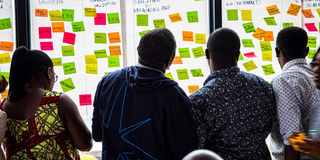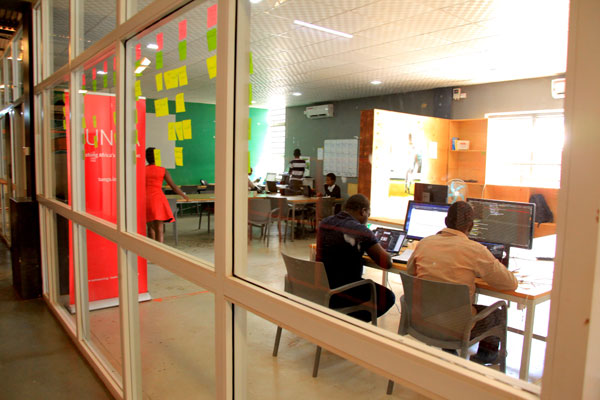Prime
Regional startups collaborate to speed up growth

Start ups brain storm ideas at the Innovation Village. A 2021 global index notes that Uganda’s start ups are struggling with poor infrastructure, resources, and unemployment. PHOTO /courtesy
What you need to know:
The Innovation Village, a startup ecosystem builder and other emerging hubs within the Kampala city are playing a key role in connecting local players, and foreign funders committed to tackling some of these challenges
Uganda is a land of entrepreneurs, but the country’s startup ecosystem has fallen eight spots behind in global rankings but continues to maintain a 97th spot in the top 100 countries.
As with numerous other African startup ecosystems, a 2021 global start up ecosystem index research captures Uganda’s struggling performance on a global scale with pressing local issues such as poor infrastructure, lack of resources, and unemployment.
The Innovation Village, a startup ecosystem builder and other emerging hubs within the Kampala city are playing a key role in connecting local players, and foreign funders committed to tackling some of these challenges.
Evidence from the research shows that there is vast growth potential in Uganda with seed efforts that can scale high impact startups.
The Uganda ecosystem is leveraging one of the world’s youngest populations, providing affordable talent and an affinity for adopting the latest technologies.
Elsewhere across the region, Uganda’s neighbours such as; Rwanda and Kenya have recorded several startup successes.
Rwanda’s entrepreneur Visas for ICT startups are a major contributor to the success of the country’s ecosystem, making it an attractive relocation option for entrepreneurs in the region.
But, even so, Rwanda according to the index report has major challenges to overcome: a lack of infrastructure, poor Internet connections, and a shortage in venture capital and other funding options, all of which prevent business development.
One of the most advanced economies in Africa, Kenya has become an innovative tech hub, thanks to a growing culture of entrepreneurship, and her strong English speaking point of access to the African market.
Kenya’s government has been involved in startup ecosystem development since 2013, with the launch of Konzo Techno City, a tech park project built outside of Nairobi attracting global tech giants such as Google, Microsoft, Samsung, and Intel.
Funding problem
Startups across the region are struggling from a lack of access to funding and capital.
This funding problem which, according to the research, when it comes to scaling a project or business, means many worthwhile startups never make it past their early stages.
Experts opine that East African start- ups can thrive better with support and collaboration from eco system builders such as innovation hubs across the region.
This discussion formed part of the recent workshop on Empowering Start-up Community which is part of the EU: Africa The Journey programme.
Innovation experts at the workshop from Garage 48 and Estonia Centre for International Development in partnership with the Innovation Village are working to boost the local start-up eco system.
Arthur Mukembo, the lead Future Lab Studio at Innovation Village, notes the startup ecosystem needs collaboration and network ties to scale up and this can only happen between start-up hubs within neighbouring countries.
“We want to see how you can enable Ugandan startups to expand into each of your markets as well. Ultimately, we are stronger together and have a great opportunity in the East African Community and the Africa Continental Free Trade Area,” Mukembo says.
In his view, Uganda’s start-up ecosystem has registered growth and continues to experience disruptive digitalisation, growing interests and engagement from venture capitalists and investors across the globe.
Therefore, strategically positioning startups will maximize their potential and tap into the opportunities offered by the East Africa ecosystem to attract avenues for innovation, venture capital firms and ease ways of doing business.
Joao Rei, a host and mentor at Garage 48, says creating an African connection for start – up communities across Africa will enable cross-border connections and form a team of think tanks.
This perhaps could help create an understanding of Africa’s start-up most pressing challenges and using their experience to create solutions with utmost impact to the ecosystem.
“We are discussing startups, the problems they face in the East African region, and how we as a community of supporters of the ecosystem can help them,” Rei notes.
Building start up
He adds that building a startup starts with the idea and realising that within the African context needs loosening up by sharing the idea with the people.
Fridah Ntarangwa, founder of Zidicircle, says sustainable entrepreneur programmes are key but such programme development borders on best practices from other people who are within a similar industry.
From the growth challenges such as limited funding mapped out by entrepreneurs at the early and later stage during the workshop.
They intend to develop a best practice manual on tackling these issues and a resource guide on the opportunities, funding and investment sources and giving recommendations on how to support them during such impeding moments.
“We need partnerships so we can work with all the players. Our next steps include ecosystem mapping,”Ntaragwe notes.
“As an ecosystem, we are disconnected so we need to build membership and this will give us a way forward on collaboration,” Mukembo notes.
The future for most start- ups will now focus on partnering with Entrepreneur Support Organisations with the purpose of connecting innovators and tech-enabled startups to available opportunities, tools and the needed capital. This is meant to solidify their businesses to be profitable, attract investment and move beyond early-stage adopters.




